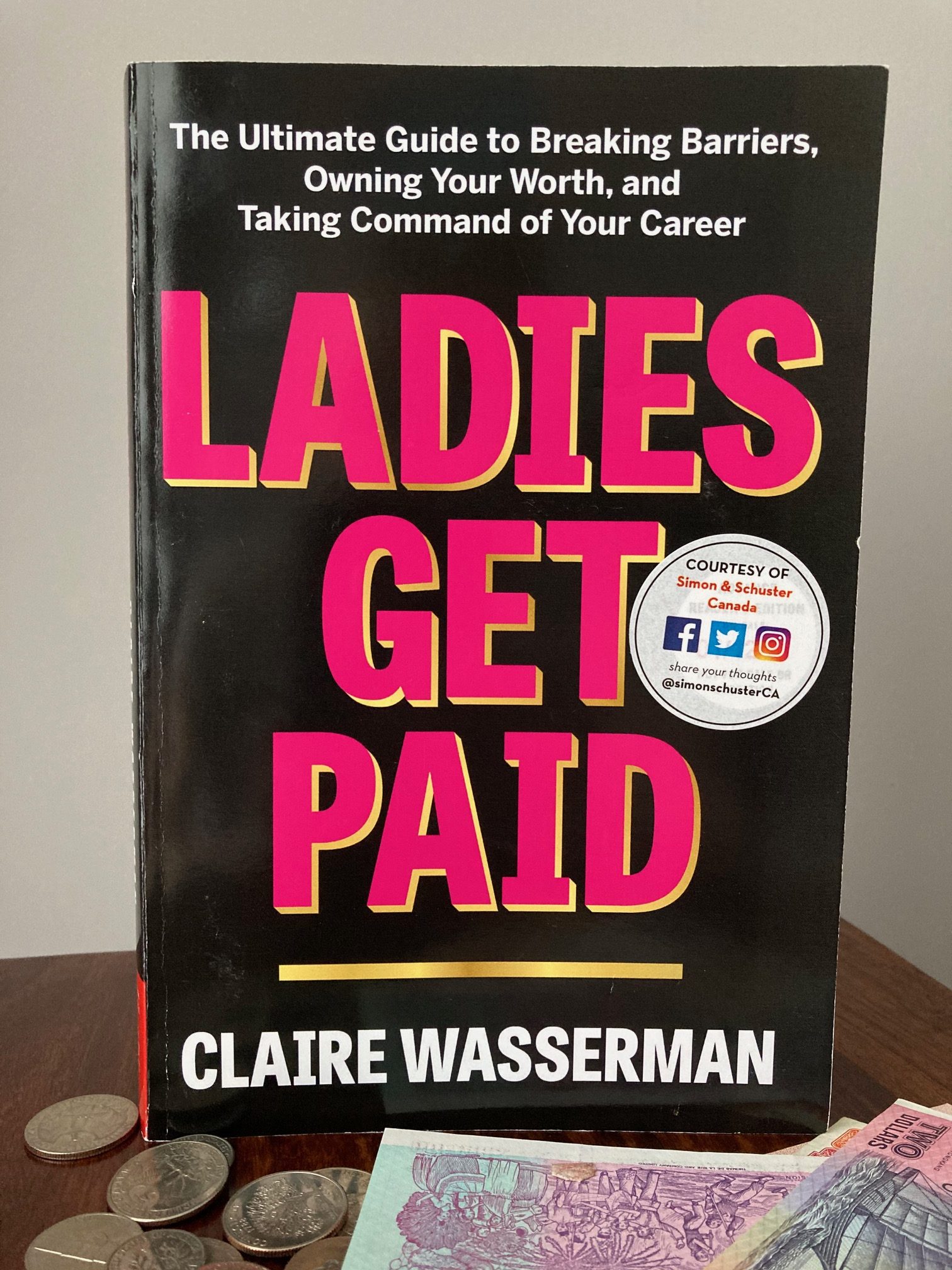Book Review: Ladies Get Paid by Claire Wasserman

Does a book cover with hot pink letters and the word “Ladies” in the title give you a certain impression of what you’ll find inside? If you’re anything like me, you may write a book off simply based on its colour scheme alone (why does it have to be pink for god’s sakes?) but if I’m being honest with myself, I love pink, and I begin lots of emails with the salutation “Ladies” so clearly I’m the target audience no matter how loathe I am to admit it. Ladies Get Paid by Claire Wasserman is for working women eager to get ahead in their career and willing to put in the effort to accomplish their goals. In a nutshell, this book is about pushing past your comfort zone which is something I struggle with. I love routines and predictability is my jam but the advice in this book got me all fired up so I’m excited to shared it with you.
Book Summary
Claire Wasserman founded a global community called Ladies Get Paid which advocates for the professional advancement of women. She advises corporations on how to champion diversity and equity in their offices, and she’s a top-notch networker. In this, her first book she includes various case studies of particular women and their experiences of transitioning careers, experiencing various forms of harassment, gunning for a promotion, and negotiating pay raises. She includes easy-to-follow advice with clear reasoning behind it on how to deal with these common roadblocks in the workplace. She weaves in a few examples of her own life, including how and why she started Ladies Get Paid, as well as an inspiring story about a famous young female U.S. politician that has a fiery disposition we all know and love. You’ll have to read the book yourself to experience that little gem for yourself!
My Thoughts

I appreciate how inclusive Wasserman attempts to make this book. She’s quick to point out that women of colour are routinely discriminated against in the working world, as are working mothers. She deals specifically with these issues in two separate case studies, where the women faced hurdles that would only apply to someone with a child, and someone who is not white. This may seem unnecessary to some, but by placing these problems on a continuum, it made me realize how important it is for me, a white woman, to speak out against any form of discrimination in the workplace, because it helps pave the path for women who come after me. Luckily, I work in an industry that is female-dominated and typically quite flexible when it comes to work-life balance, but not every woman has that luxury, especially in male-dominated environments like law and automotive. And before you point out that things are better than they used to be (which I agree with and acknowledge), there is still a ways to go in many work environments. My female peers, my age or younger have told me stories that made me want to burst into a fiery rage with the injustice, but Wasserman points out that fighting for everyone’s rights in the workplace is our best way to overcome these disparities.
To be completely honest, reading this book sort of felt like work in itself, but that’s because I was truly learning things from it that I knew I needed to apply to my own life, so in a way, it was a form of ‘homework’ for me. It’s easy to read books about things that I already do, but reading straight talk about why I need to champion my own skills while negotiating a raise is uncomfortable to me, which is exactly why I needed to read this book. Hell, it’s why I expressed interest in it when I saw it in the publishers catalogue, because I knew it would educate me on a subject I badly needed to throw myself into. If I was really on the ball I’d be able to compare this to the book Lean In by Sheryl Sandberg, because I imagine it deals with very similar topics, but I haven’t read that one – if anyone else has, please let me know in the comments what you thought about it.
The best part about this book is its optimism; it doesn’t dwell on the fact that things are harder for women, it quickly establishes it as a fact using clear data and statistics, and then gives us a roadmap to change it. Many people have referred to the pandemic as the ‘she-cession’ because there is overwhelming evidence pointing to the fact that women have had to shoulder the burden of increased childcare while daycares and schools shut down. With that in mind, this book is more important than ever because as the world rights itself again, more women will find themselves with even bigger challenges ahead of them, and it’s support that’s offered in this book that we will need to move forward.





When people point out that things are better for women in the workplace, I point out how millions of women left the workplace during the pandemic to assist young children doing e-Learning. Women didn’t leave the workplace to stay home with their children because it’s the material thing to do; likely, their families sat down, looked at their finances, and realized men still make more than women, so if one person’s income had to be dropped, it would be the person who makes less — which is still women.
Yup, absolutely. Women do still make less than men, which is why we need books like this!!!
That cover really looks retro- like late 1980s or early 90s. But it’s arresting. What an interesting choice.
Actually that’s a good point, I never realized that. Plus, one of the branding pieces she uses for her “ladies get paid” organization is pink scrunchies with dollar signs on them LOL
Yes, it’s been interesting to see that the burden of childcare and home schooling has fallen directly on women despite the pretence that men now take a full share in domestic life. It has also been interesting to see that middle-class women seem to want the schools to stay shut while working-class women want them open (over here). My guess is that’s because the middle-class women can work from home so don’t lose income, whereas for shop workers, cleaners, etc, no school means no job means no food for their kids. It has also intrigued me that middle-class women, largely, haven’t much cared about what’s happening to their working-class sisters. I’m truly outraged at the demands that middle-class teachers should be allowed to queue-jump for vaccines while working-class grocery store workers, who’ve worked throughout the whole thing without the incessant complaining, shouldn’t be prioritised. We live in two worlds…
Oh that’s interesting that teachers have been able to jump the vaccine line over there! The majority of us Canadians won’t be getting ours until the late summer early fall it sounds like…
Ah, they haven’t, but they’ve been campaigning to – happily the government has held out so far. Anyway they’re planning to have done everyone by July so not long to wait now! Mine is next week and I’m so excited! :D
OMG FF so exciting!!! I’m so happy for you.
Also, I’m firmly middle class and praying our schools stay open LOL working from home with kids is basically impossible
This sounds great! I especially like the focus that what’s better for one group of women makes it better for all of us and we need to support one another. This current recession has really demonstrated how much our society relies on the unpaid labour of women. I’ve talked to several moms who expected to go back to work or increase their work hours this year after sending a child to kindergarten but have been unable to. I haven’t heard any dads talking about that.
yup, absolutely. It’s a nice book for a lot of reasons, but it’s especially applicable right now, when we have to insist on our rights inside the home (fair splitting of domestic duties) and in the workplace
Neither the title nor the cover pull me in, although these are definitely topics relevant to me (I wouldn’t wear those scrunchies either and can’t imagine who would?!). It’s overwhelming to think how much systemic change is required to truly make lasting changes in this regard; it doesn’t matter how much one’s male partner might be on-board for equality, when the two of you have to make a decision that leaves one of you available for FT child-care, it comes down to the bottom-line for many (not just a question of whether you’ll be able to take a vacation but whether you eat three meals/day). I’ve only seen the TED talk for Lean In, but I’ve been more interested in the books produced in response to it. I mean, if there’s a Lean Out, one has to wonder about the other side of the story, right? LOL
Sometimes I have the sudden urge to Lean Out when something frustrating happens at work, or I feel once again ‘guilty’ about staying home with a sick kid, etc. It’s not easy being a working mom, that’s for dang sure.